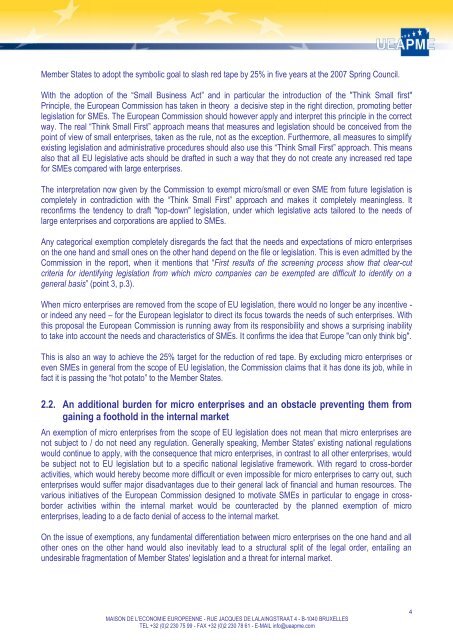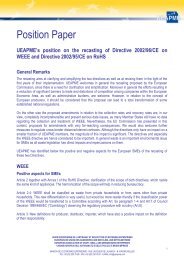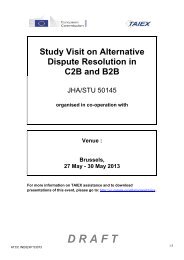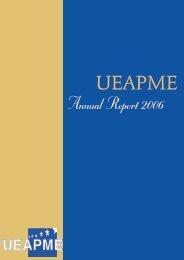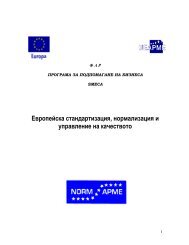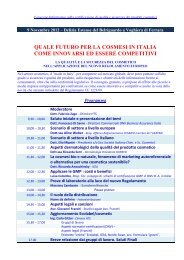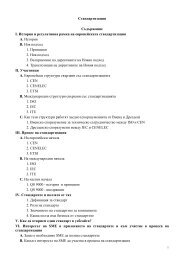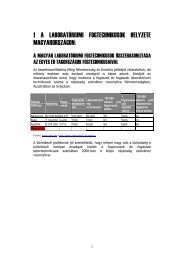Minimising regulatory burden for SMEs – Adapting EU ... - UEAPME
Minimising regulatory burden for SMEs – Adapting EU ... - UEAPME
Minimising regulatory burden for SMEs – Adapting EU ... - UEAPME
Create successful ePaper yourself
Turn your PDF publications into a flip-book with our unique Google optimized e-Paper software.
Member States to adopt the symbolic goal to slash red tape by 25% in five years at the 2007 Spring Council.<br />
With the adoption of the “Small Business Act” and in particular the introduction of the "Think Small first"<br />
Principle, the European Commission has taken in theory a decisive step in the right direction, promoting better<br />
legislation <strong>for</strong> <strong>SMEs</strong>. The European Commission should however apply and interpret this principle in the correct<br />
way. The real “Think Small First” approach means that measures and legislation should be conceived from the<br />
point of view of small enterprises, taken as the rule, not as the exception. Furthermore, all measures to simplify<br />
existing legislation and administrative procedures should also use this “Think Small First” approach. This means<br />
also that all <strong>EU</strong> legislative acts should be drafted in such a way that they do not create any increased red tape<br />
<strong>for</strong> <strong>SMEs</strong> compared with large enterprises.<br />
The interpretation now given by the Commission to exempt micro/small or even SME from future legislation is<br />
completely in contradiction with the “Think Small First” approach and makes it completely meaningless. It<br />
reconfirms the tendency to draft "top-down" legislation, under which legislative acts tailored to the needs of<br />
large enterprises and corporations are applied to <strong>SMEs</strong>.<br />
Any categorical exemption completely disregards the fact that the needs and expectations of micro enterprises<br />
on the one hand and small ones on the other hand depend on the file or legislation. This is even admitted by the<br />
Commission in the report, when it mentions that “First results of the screening process show that clear-cut<br />
criteria <strong>for</strong> identifying legislation from which micro companies can be exempted are difficult to identify on a<br />
general basis” (point 3, p.3).<br />
When micro enterprises are removed from the scope of <strong>EU</strong> legislation, there would no longer be any incentive -<br />
or indeed any need <strong>–</strong> <strong>for</strong> the European legislator to direct its focus towards the needs of such enterprises. With<br />
this proposal the European Commission is running away from its responsibility and shows a surprising inability<br />
to take into account the needs and characteristics of <strong>SMEs</strong>. It confirms the idea that Europe "can only think big".<br />
This is also an way to achieve the 25% target <strong>for</strong> the reduction of red tape. By excluding micro enterprises or<br />
even <strong>SMEs</strong> in general from the scope of <strong>EU</strong> legislation, the Commission claims that it has done its job, while in<br />
fact it is passing the “hot potato” to the Member States.<br />
2.2. An additional <strong>burden</strong> <strong>for</strong> micro enterprises and an obstacle preventing them from<br />
gaining a foothold in the internal market<br />
An exemption of micro enterprises from the scope of <strong>EU</strong> legislation does not mean that micro enterprises are<br />
not subject to / do not need any regulation. Generally speaking, Member States' existing national regulations<br />
would continue to apply, with the consequence that micro enterprises, in contrast to all other enterprises, would<br />
be subject not to <strong>EU</strong> legislation but to a specific national legislative framework. With regard to cross-border<br />
activities, which would hereby become more difficult or even impossible <strong>for</strong> micro enterprises to carry out, such<br />
enterprises would suffer major disadvantages due to their general lack of financial and human resources. The<br />
various initiatives of the European Commission designed to motivate <strong>SMEs</strong> in particular to engage in crossborder<br />
activities within the internal market would be counteracted by the planned exemption of micro<br />
enterprises, leading to a de facto denial of access to the internal market.<br />
On the issue of exemptions, any fundamental differentiation between micro enterprises on the one hand and all<br />
other ones on the other hand would also inevitably lead to a structural split of the legal order, entailing an<br />
undesirable fragmentation of Member States' legislation and a threat <strong>for</strong> internal market.<br />
MAISON DE L'ECONOMIE <strong>EU</strong>ROPEENNE - RUE JACQUES DE LALAINGSTRAAT 4 - B-1040 BRUXELLES<br />
TEL +32 (0)2 230 75 99 - FAX +32 (0)2 230 78 61 - E-MAIL info@ueapme.com<br />
4


